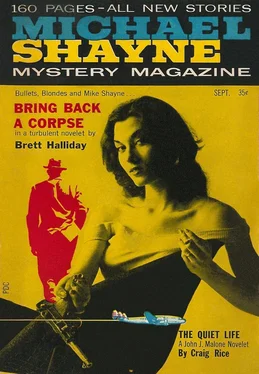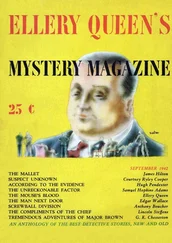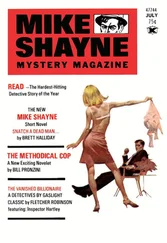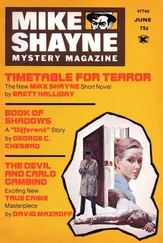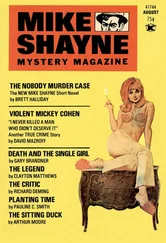Robert Bloch - Michael Shayne Mystery Magazine. Vol. 1, No. 1. September 1956
Здесь есть возможность читать онлайн «Robert Bloch - Michael Shayne Mystery Magazine. Vol. 1, No. 1. September 1956» весь текст электронной книги совершенно бесплатно (целиком полную версию без сокращений). В некоторых случаях можно слушать аудио, скачать через торрент в формате fb2 и присутствует краткое содержание. Город: New York, Год выпуска: 1956, Издательство: Renown Publications, Жанр: Детектив, на английском языке. Описание произведения, (предисловие) а так же отзывы посетителей доступны на портале библиотеки ЛибКат.
- Название:Michael Shayne Mystery Magazine. Vol. 1, No. 1. September 1956
- Автор:
- Издательство:Renown Publications
- Жанр:
- Год:1956
- Город:New York
- ISBN:нет данных
- Рейтинг книги:3 / 5. Голосов: 1
-
Избранное:Добавить в избранное
- Отзывы:
-
Ваша оценка:
- 60
- 1
- 2
- 3
- 4
- 5
Michael Shayne Mystery Magazine. Vol. 1, No. 1. September 1956: краткое содержание, описание и аннотация
Предлагаем к чтению аннотацию, описание, краткое содержание или предисловие (зависит от того, что написал сам автор книги «Michael Shayne Mystery Magazine. Vol. 1, No. 1. September 1956»). Если вы не нашли необходимую информацию о книге — напишите в комментариях, мы постараемся отыскать её.
Michael Shayne Mystery Magazine. Vol. 1, No. 1. September 1956 — читать онлайн бесплатно полную книгу (весь текст) целиком
Ниже представлен текст книги, разбитый по страницам. Система сохранения места последней прочитанной страницы, позволяет с удобством читать онлайн бесплатно книгу «Michael Shayne Mystery Magazine. Vol. 1, No. 1. September 1956», без необходимости каждый раз заново искать на чём Вы остановились. Поставьте закладку, и сможете в любой момент перейти на страницу, на которой закончили чтение.
Интервал:
Закладка:
They had found a bottle of liquor from a store that had been robbed, along with the twenty-dollar bills. One of the bills had had a mark on it, a blob of purple ink. The old man who owned the liquor store had remembered it. So had the bank teller who had given it to him, not many hours before the stickup.
When the police had questioned Mac, he had denied everything. If they had found a bottle of liquor, it belonged to Gladden. Mac had removed all his belongings when he moved. He had moved, because he couldn’t get along with Gladden. Gladden? An oddball, a character who just wasn’t right.
Mac had laughed about the twenty-dollar bills. Did that make sense? Going around giving away twenties? Besides, at the time of the stickup, he had been in another part of town, working out an arrangement with the piano player of the combo. The piano player confirmed it.
Although the store owner, under cross-examination, admitted having been knocked over the head before getting a good look at the stickup man, he had clung tenaciously to his identification of Gladden as the assailant. He couldn’t describe the man in detail, but he could describe him closely enough. And the description did fit Gladden. So did the bottle of liquor and the bill with the purple blob on it. The jury had taken less than two hours to return a verdict of guilty.
At times, these events possessed for Gladden a faded, nebulous quality, as if they were part of a vaguely remembered dream, or a moving picture seen long ago. The only reality had been the reality of prison. His return to Hollywood brought fuzzy memories back into sharp focus, so vividly clear that they dimmed the actuality surrounding him. People passing him on the sidewalk, cars moving, now swiftly, now slowly, along the street, were without substance and meaning. He turned and walked in the direction of La Cienega Boulevard, thinking of the morning he had first met Mac.
Hollywood had been a new and exciting adventure then. On his way to deliver some art work to an advertising agency on the Sunset Strip, Gladden had stopped at Schwab’s Drug Store for coffee. The counter was crowded with late breakfasters, as Gladden slid into the one vacant seat, alongside a big, broad-shouldered, blond character who wore sports clothes and a scarf knotted around his throat. He looked like a movie actor or, according to Gladden’s conception, a director. Over coffee, they had exchanged a dozen or so words. Then Gladden had left.
Their second meeting had also been at Schwab’s. It was dinner time — early — about five-thirty. When Gladden came in, Mac had been sitting alone at the end of the counter, a copy of Variety propped up in front of him against a sugar shaker. He had glanced up and said, “Hi! How’s the art racket?”
Gladden had looked puzzled, and Mac had laughed. “I noticed those cartoons you had with you the other morning,” was his explanation. “They were real George. Yours, or are you agenting for somebody?”
“Mine,” Gladden had said, “and I wish some of these ad agencies thought as well of them.”
“Hell, whatta you wasting your time on those chiseling fifteen percenters for? You oughta be with one of the big studios, doing animations. You got a touch.”
“That’s what I keep telling myself, but so far I haven’t even got inside a studio gate,” Gladden had replied.
This time they had talked all through a leisurely dinner. Gladden learned that his mew friend was neither an actor nor a director, but played trumpet with a band on a television show. His name was Lyle MacComber, and he knew his way around Hollywood. With easy familiarity, he had dropped places and names, some of the latter so important that even Gladden recognized them.
“You know Al Corvak over at Paramount?”
“The art director? I’ve heard of him.”
“Al’s an old buddy of mine. During the war, we were in Special Services together. A prince. Say, what about me setting up a lunch date so you can meet him? It won’t do you a bit of harm. How about next Thursday?”
“That’ll be fine with me.” Gladden had tried to keep the eagerness out of his voice.
“Okay, I’ll call Al and arrange it, and then phone you. What’s your number?”
“Sunset 2-6421.”
MacComber had scribbled it on the margin of his copy of Variety and said, “Great! I’ll get in touch with Al tomorrow.”
When they left Schwab’s Gladden had picked up MacComber’s dinner check.
He had heard nothing from MacComber for almost three weeks. Then, late one night, the phone rang, and the voice over it had sounded familiar.
“Johnny?”
“Yes.”
“This is Mac.”
“Who?”
“Ol’ Massa MacComber. Lyle MacComber. Ah been havin’ me a whole hatfulla trouble, son. Damned Yankees done run me off the plantation.” He had made Gladden laugh, as he was always able to do. “No foolin’, Johnny, I’m in a spot. Had a hassel with my landlady, and she gave me the heave-ho. Think you could put me up for tonight? Wanta see you anyway. Just had a talk with Al Corvak — he’s been out of town, but he’s back now — we’ll get together with him and rig that date.”
After Mac arrived, they had talked until almost daylight, mostly about Gladden’s prospects. If nothing came of the get-together with Al Corvak, well, Mac had other connections. Solid, too — real solid. Before they went to bed, plans were made for Mac to move in with Gladden and share the rent.
He seldom did — nor did any of his connections pay off. Yet, somehow, Gladden hadn’t resented this. Mac was always a lot of fun. Gladden liked him. A long time had passed before Gladden got Mac really pegged. A long time — and three years of that time Gladden had spent in prison.
Three years — thirty-six months! A thousand and ninety-five days of steel and concrete and antiseptic odors. Grueling work in the jute mill, which had ruined his hands so that he might never be able to paint again. As he walked the palm-fringed sidewalk, he thrust his hands in front of him, opened and closed his fingers, now too stiff to manipulate a brush. But not too stiff to take care of Mac...
In his imagination, Gladden had lived that scene again and again. He’d be waiting for Mac in the darkness of Mac’s apartment, perhaps in the shadows of the empty street outside the home of Mac’s newest girl friend, perhaps in the dim, deserted parking lot where, after a late show, Mac would come for his car.
When Mac appeared, Gladden would say softly — oh, so softly, “Hello, Mac. Remember me? Johnny Gladden?” He’d let Mac experience one agonizing, fear-congealed moment. Then he’d press the muzzle of the little gun into Mac’s belly, and squeeze the trigger. The little gun that hardly made any noise...
He walked on.
The Sereno — actually El Sereno — was not an apartment house but a motel — two rows of bungalows, each with a garage, set in a U shape around a central concrete area. Sere and dusty-looking palms flanked the driveway leading into the area on which several cars were parked. The first bungalow to the right bore a sign reading Office. Gladden decided he must play this cautiously, make his inquiries about MacComber seem casual. He went on in.
An elderly, undersized man, wearing khaki trousers and a sparkling clean white shirt, moved aimlessly behind the desk. He had watery blue eyes and a melancholy mustache. He was listening to a small radio with the volume full up. He turned it down a trifle before he said, “Yes, sir. What can I do for you?”
“What are your rates here, Pop?”
“Single?”
“That’s right.”
“Six dollars a day.”
“Oh- oh! That’s too rich for me. I figured it might be, just from the looks of the place. A friend of mine recommended it. Guy named MacComber. He still around, or has he moved someplace else?”
Читать дальшеИнтервал:
Закладка:
Похожие книги на «Michael Shayne Mystery Magazine. Vol. 1, No. 1. September 1956»
Представляем Вашему вниманию похожие книги на «Michael Shayne Mystery Magazine. Vol. 1, No. 1. September 1956» списком для выбора. Мы отобрали схожую по названию и смыслу литературу в надежде предоставить читателям больше вариантов отыскать новые, интересные, ещё непрочитанные произведения.
Обсуждение, отзывы о книге «Michael Shayne Mystery Magazine. Vol. 1, No. 1. September 1956» и просто собственные мнения читателей. Оставьте ваши комментарии, напишите, что Вы думаете о произведении, его смысле или главных героях. Укажите что конкретно понравилось, а что нет, и почему Вы так считаете.
